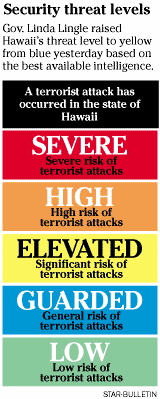

Isle officials assure In the hours before President Bush gave the order to attack Iraq late yesterday, officials here from the governor to the Honolulu police chief tried to reassure residents that Hawaii was not a known target but that safety precautions have been taken -- many of them not visible to civilians -- against terrorist attacks.
residents of increased
security measures
By Sally Apgar and Crystal Kua
sapgar@starbulletin.com, ckua@starbulletin.com
After consulting with intelligence experts and others, Gov. Linda Lingle decided yesterday to raise Hawaii's security threat level to "yellow" for an "elevated" threat of terrorist attack from "blue," indicating a low level of threat.

Lingle timed the security upgrade for 3 p.m. -- the exact hour that the deadline passed, unheeded, for President Saddam Hussein and his two sons to leave Iraq.
Until Lingle raised the threat level, Hawaii was one of the last states in the country to be at a low or "guarded" security level.
On Monday, Homeland Security Secretary Tom Ridge raised the national level to orange from yellow, indicating an "elevated" or "significant risk of terrorist attack."
"You won't see any massive buildup of security at the yellow level," Lingle told the Star-Bulletin. "That would occur if we go to orange. You would start to see significant restrictions in access to government buildings, schools would be affected and whether or not children come to school, so it becomes much more serious at the next level."
At a news conference yesterday, Lingle said, "The decision to raise our security alert status was based on the best available intelligence provided by the U.S. military and the Department of Homeland Security."
She added, "Although there is still no credible or direct threat to the state of Hawaii, we are aware of increased terrorist activity worldwide due to the initiation of conflict with Iraq."
Maj. Gen. Robert Lee, Hawaii's adjutant general, agreed with Lingle's comments, saying the "latest intelligence indicates there is still no credible threat to Hawaii."
Security was boosted yesterday at critical locations in Hawaii such as oil refineries, power plants, telecommunications facilities and other sites key to the state's infrastructure. Security was also beefed up in public buildings and elsewhere.
The Honolulu Police Department said it would increase its presence and probably be most visible in more patrols along major highways.
"You'll see more police presence, basically, out in certain areas," Honolulu police Chief Lee Donohue said. "And we are prepared to defend our community here."
Maj. Charles Anthony, a spokesman for the state Department of Defense, said, "People won't see a lot of change in security on the surface."
Anthony said many security measures are internal to various state and federal agencies, the ports and certain industries key to power generation, telecommunications and state government.
"People won't really see what we are doing, and we aren't going to share what we are doing," Anthony said.
At another news conference yesterday, Honolulu Mayor Jeremy Harris also sought to reassure residents that the state was not a target but was ready to respond to terrorist attack.
"I believe we are the best-prepared city in the nation," Harris said. "We have ramped up the security of this island, and our citizens are safe and secure."
Flanked by officials with the police, fire, Civil Defense and other emergency services, Harris said critical city infrastructure is being protected "so that it will not be possible for terrorists to take over our water supply or taint our water supply with biological or chemical weapons."
The mayor would not give details about where the city was focusing security measures.
Harris did say that critical city facilities will be safeguarded to make sure that ventilation shafts and other areas in these facilities are not subject to attack.
Trained city personnel will be using hand-held monitors to sample the air for anthrax, botulism toxin, the plague or any other biological weapons of mass destruction. Such city personnel will be deployed at public events, where security will also be stepped up.
The city also has air-sampling stations that will continually monitor the air to detect the release of biological contaminants.
"So if anthrax is released by a terrorist from the balcony of a hotel room in Waikiki, our fixed-air sampling system will detect it prior to anyone becoming symptomatic," Harris said.
Since airports, seaports and federal buildings are under federal jurisdiction, security there increased Monday in accordance with the change to orange at the national level. Vehicle searches have been reinstituted at Honolulu Airport.
The U.S. Coast Guard has increased surveillance activities of the ports with more "patrols and flyovers," said Lt. Cmdr. Todd Offutt.
"We have more uniformed and civilian personnel. We will make increased patrols, but we do them randomly on purpose so no one can predict enforcement," he said.
Donohue said police presence will be increased using overtime.
"Some of the nonpatrol officers will be called in to help us man certain sites to add to the visibility -- the beat officers themselves," he said. "I think you saw this after the attack against America; for the first few months after that, you saw a lot of police presence along the highways. One (reason) was to monitor traffic, make sure that you had the movement of traffic. But it's (also) kind of an assuring factor for the community that you do have police officers out there."
Star-Bulletin reporters Nelson Daranciang, Crystal Kua and Rod Antone contributed to this report.
State Department of Defense